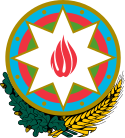
Back السياسة في أذربيجان Arabic Azərbaycanın dövlət quruluşu Azerbaijani Палітыка Азербайджана Byelorussian Дзяржаўны лад Азэрбайджану BE-X-OLD Държавно устройство на Азербайджан Bulgarian আজারবাইজান#রাজনীতি Bengali/Bangla Política de l'Azerbaidjan Catalan Politisches System Aserbaidschans German Política de Azerbaiyán Spanish سیاست در جمهوری آذربایجان Persian
This article has multiple issues. Please help improve it or discuss these issues on the talk page. (Learn how and when to remove these template messages)
|
 |
|---|
|
|
The Politics of Azerbaijan take place in an authoritarian system where elections are not free and fair, political opponents are repressed, civil rights are limited, human rights abuses are widespread, corruption is rampant, and power is concentrated in the hands of President Ilham Aliyev and his extended family.[1][2][3]
Azerbaijan is nominally a semi-presidential republic, with the President of Azerbaijan as the head of state, and the Prime Minister of Azerbaijan as head of government. Executive power is exercised by the president and the government. Checks and balances are nominally ensured by the legislature (Azerbaijan's National Assembly) and the Judiciary but both institutions are in practice firmly controlled by the executive.[4][5]
The politics of Azerbaijan have since 1969 been dominated by the Aliyev family. Heydar Aliyev governed Soviet Azerbaijan from 1969 to 1982 as First Secretary of the Communist Party of Azerbaijan, and as President of Azerbaijan from 1993 to 2003 after seizing power in the aftermath of a 1993 military coup.[6][7] Ilham Aliyev, Heydar's son, was installed as president in 2003.
- ^ "Azerbaijan: Country Profile". Freedom House. Retrieved July 3, 2021.
- ^ "Everything you need to know about human rights in Azerbaijan". www.amnesty.org. Retrieved July 3, 2021.
- ^ "World Report 2021: Rights Trends in Azerbaijan". Human Rights Watch. December 10, 2020. Retrieved July 3, 2021.
- ^ LaPorte, Jody (2016). "Semi-presidentialism in Azerbaijan". In Elgie, Robert; Moestrup, Sophia (eds.). Semi-Presidentialism in the Caucasus and Central Asia. London: Palgrave Macmillan (published May 15, 2016). pp. 91–117. doi:10.1057/978-1-137-38781-3_4. ISBN 978-1-137-38780-6. LCCN 2016939393. OCLC 6039791976. Retrieved October 13, 2017.
LaPorte examines the dynamics of semi-presidentialism in Azerbaijan. Azerbaijan's regime is a curious hybrid, in which semi-presidential institutions operate in the larger context of authoritarianism. The author compares formal Constitutional provisions with the practice of politics in the country, suggesting that formal and informal sources of authority come together to enhance the effective powers of the presidency. In addition to the considerable formal powers laid out in the Constitution, Azerbaijan's president also benefits from the support of the ruling party and informal family and patronage networks. LaPorte concludes by discussing the theoretical implications of this symbiosis between formal and informal institutions in Azerbaijan's semi-presidential regime.
- ^ "Azerbaijan: Nations in Transit 2023 Country Report". Freedom House. Retrieved December 31, 2023.
- ^ Waal, Thomas de (2013), "Black Garden: Armenia and Azerbaijan through Peace and War", Black Garden, New York University Press, pp. 106, 148–149, 227, doi:10.18574/nyu/9780814770825.001.0001/html?lang=en, ISBN 978-0-8147-7082-5
- ^ Altstadt, Audrey L. (1997), Parrott, Bruce; Dawisha, Karen (eds.), "Azerbaijan's struggle toward democracy", Conflict, Cleavage, and Change in Central Asia and the Caucasus, Democratization and Authoritarianism in Post-Communist Societies, Cambridge University Press, pp. 110–155, ISBN 978-0-521-59731-9
© MMXXIII Rich X Search. We shall prevail. All rights reserved. Rich X Search